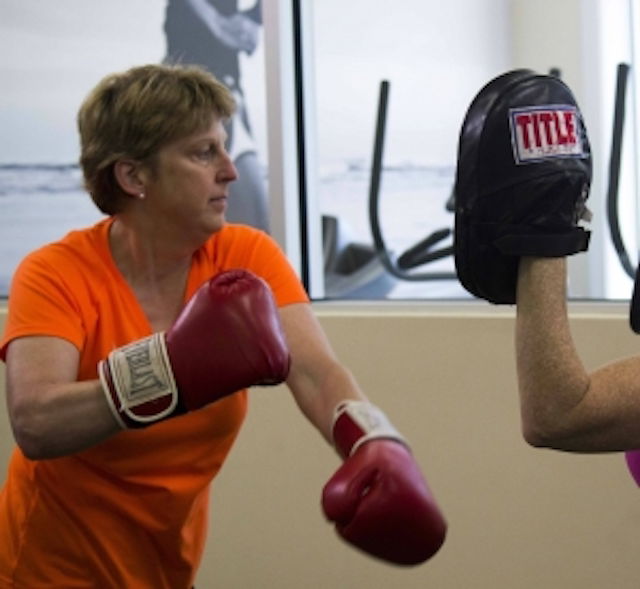
It was the time of year when many people indulge with abandon. Attorney Jan Thomas resisted, though.
On this Dec. 28, she was remaining fit by spending her lunch break in her office gym, just as she did two or three times every week.
A partner in a large firm in Richmond, Va., Jan, then 48, had a busy life as a mergers-and-acquisitions specialist with a national practice, and she relished the mid-day opportunity to keep fit and burn off some steam.
On this particular day, she was trying to squeeze in a workout before a 2 p.m. meeting. But shortly after she began peddling on the stationary bike, she lost consciousness.
Jan woke up in the hospital, terribly confused. She kept trying to ask about her 2 p.m. meeting. She could have sworn she was asking, but no one seemed to understand her.
Jan had suffered a stroke, and part of the devastation to her body was aphasia, a disorder that occurs in the areas of the brain that control speech and language.
Aphasia can affect different people in different ways. Some know what they want to say but can’t get the words out.
Aphasia also can cause difficulty finding words, difficulty understanding what others are saying or problems with reading, writing or math.
Jan’s inability to express herself was incredibly frustrating.
“I don’t want to say it’s the worst, but you can’t imagine not being able to talk,” she said.
She was determined to return to work at the law firm. But her seven-week inpatient stay turned to eight months of outpatient speech therapy, physical therapy and occupational therapy to help her re-learn to walk, use her paralyzed right arm and communicate.
The longer it lasted, the more she realized she was not ready to return – and may never be. It’s been about 3½ years since her stroke.
“I would like to talk clearly, but I will have to go slowly,” Jan said. “Sometimes I can’t come up with the words. If you had talked to me before the stroke, it would be completely different.”
“Now,” she said, “people think that because I can talk—that is, I can say the words or say a word—that I’m OK, but I can’t say what I want to say.
I’m smart enough that I can get by saying whatever so the average person doesn’t even see this, but I can’t get it out quickly or logically sometimes.”
Another change was Jan and Brent, her husband of 28 years, moving from their home on 10 acres outside of Richmond to a condo in the city. Part of the reason was because of how difficult driving was for Jan due to spasticity.
Even now, spasticity in her right foot and arm limits her to local routes and shorter periods behind the wheel.
Being at home was isolating. So when Jan received a call from her speech therapist that a support group for people with aphasia was forming, she said she would like to join.
The group, started by the daughter of a stroke survivor and several speech therapists at Virginia Commonwealth University Health System, would be called RVA Aphasia, for Richmond, Va.
“Some could talk, some couldn’t, but all of them could understand,” Jan said.
At the group’s second meeting, Jan was asked to be president. “And so I said, ‘yes,’” Jan said with a laugh.
The group – which also includes a public speaker, a corporate executive and an artist among others – wanted to find a way to help others with aphasia to be better understood by both health professionals and the public.
They came up with the idea of a documentary video.
The result of their hard work is an 18-minute video titled, “Patience, Listening and Communicating with Aphasia Patients.”
It went online in September. It shares insights of RVA Aphasia’s members and offers practical tips on interacting with aphasia patients (“truly listen,” “slow your rate” and “repeat or rephrase” among them).
The video, which points viewers toward the American Heart Association’s website for more information on aphasia, debunks misconceptions about the disorder.
There is no need, for example, to raise your voice or come closer when speaking to someone with aphasia, as it is not related to hearing, nor does it affect intelligence.
As an educational tool, Jan believes the video will help advance the mission of the American Heart Association and the American Stroke Association. The message is especially timely in May, which is American Stroke Month.
“We’ve gotten an amazing response,” she said. “I think part of it is people really didn’t know enough about aphasia. People who are living with it are just desperate for information and acceptance.”
If you care about stroke, please read studies about this blood thinner drug plus aspirin could strongly reduce stroke risk, and healthy habit that could lower risks of stroke and heart rhythm problems.
For more information about brain health, please see recent studies about retired entertainer thought she slept awkwardly. It was a stroke, and results showing that after three strokes, he ‘overheard’ the grim prognosis and fought back.



